The Internet, E-Business and Web 2.0 in Context
 Web 2.0 and social networks readily appear as hype, but I will argue that they are actors in a much larger drama, the emergence of the Knowledge Economy, which is currently in its third phase, Web 2.0 and social networks. By understanding the transformation of relationships among your customers and between your customers and your company, you will be in a much better position to guide your company through this area of tremendous change. Web 2.0 and social networks readily appear as hype, but I will argue that they are actors in a much larger drama, the emergence of the Knowledge Economy, which is currently in its third phase, Web 2.0 and social networks. By understanding the transformation of relationships among your customers and between your customers and your company, you will be in a much better position to guide your company through this area of tremendous change.
The Ascendance of the Knowledge Economy
The Knowledge Economy is a post-industrial economy in which value is primarily created through information, and differentiation is achieved by explicitly focusing on customer experience itself rather than on products or services. The life cycles of products and services will increasingly shorten. Leaders of companies with products and services who do not understand this face rampant commoditization from which there is no escape except through unprecedented innovation. We are in the third phase of the growth of the Knowledge Economy in which it is transforming relationships. Each phase is ongoing, but the emphasis shifts over […]
Visions for Technology Leadership
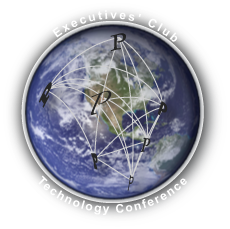 After Gary Forsee’s luncheon address, a diverse panel of executives took the stage to discuss global technology leadership. Hardik Bhatt, CIO of the City of Chicago, Steve Goldman, Director of Architecture, the Chicago Mercantile Exchange, Raymond Spencer, CEO of Kanbay International, and David Weick, Global CIO of McDonald’s, shared their visions for Chicago’s global role in the world. Janet Kennedy, Midwest General Manager of Microsoft, gracefully moderated the panel discussion. The Executives’ Club of Chicago’s quarterly Technology Conference took place March 8 at the Chicago Hilton. After Gary Forsee’s luncheon address, a diverse panel of executives took the stage to discuss global technology leadership. Hardik Bhatt, CIO of the City of Chicago, Steve Goldman, Director of Architecture, the Chicago Mercantile Exchange, Raymond Spencer, CEO of Kanbay International, and David Weick, Global CIO of McDonald’s, shared their visions for Chicago’s global role in the world. Janet Kennedy, Midwest General Manager of Microsoft, gracefully moderated the panel discussion. The Executives’ Club of Chicago’s quarterly Technology Conference took place March 8 at the Chicago Hilton.
“Getting global” can mean many things, and panelists hit the issue from many directions. I’ll venture that, more than anything, it means changing one’s mindset, focus and approach, all of which are difficult to measure. All panelists represented organizations that had had international operations for decades, so how is global different?
[…]
Sprint Nextel’s Destiny and the Demand for a New Wireless Future reports on how Sprint Nextel is betting its future on a new wired society.
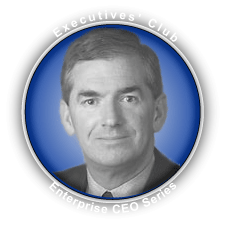 Gary D. Forsee, Chairman and CEO, Sprint Nextel Corporation, set the stage for the Executives’ Club of Chicago’s Technology Conference by outlining Sprint’s wireless strategy and a new vision for global community at the March enterprise CEO luncheon at the Chicago Hilton. Gary D. Forsee, Chairman and CEO, Sprint Nextel Corporation, set the stage for the Executives’ Club of Chicago’s Technology Conference by outlining Sprint’s wireless strategy and a new vision for global community at the March enterprise CEO luncheon at the Chicago Hilton.
Sprint’s long history reflects the transformation of the U.S. telecoms market. The company has had a key role in remaking the U.S. telecoms industry during its privatization. It competed as a competitive local exchange carrier (CLEC) and once earned most of its revenue from long distance services, which are now essentially free. After its 2005 merger with Nextel, virtually all its revenue comes from wireless services.
Moreover, Mr. Forsee promised that Chicago would be one of two pilot cities for Sprint’s WiMAX initiative later this year. Chicagoans will be among the first in the U.S. to try 4G network services.
Sprint’s Wireless Future
Sprint Nextel has seen the future, and it […]
How to Increase Your Payback from Using LinkedIn
 LinkedIn is a “social” site that will prove to be of rare benefit to business executives and professionals in building individualized collaborative networks, as I explained in detail in the GHCJ Review of LinkedIn. However, LinkedIn is seriously lacking in providing a step-by-step guide to help the motivated executive to tap its real value. The functionality of the website is easy to use, but many of the finer points of LinkedIn are lost on the majority of users. This guide attempts to address that. LinkedIn is a “social” site that will prove to be of rare benefit to business executives and professionals in building individualized collaborative networks, as I explained in detail in the GHCJ Review of LinkedIn. However, LinkedIn is seriously lacking in providing a step-by-step guide to help the motivated executive to tap its real value. The functionality of the website is easy to use, but many of the finer points of LinkedIn are lost on the majority of users. This guide attempts to address that.
[…]
UPS: Transforming Package Delivery into a One-to-One Business summarizes the CEO’s vision for meeting customer empowerment with transformation.
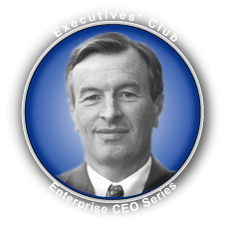 Michael L. Eskew, Chairman and CEO of UPS, outlined the package delivery giant’s vision for transforming itself into a “one-to-one” business at the Executives’ Club of Chicago’s Enterprise CEO Lunch, 15 February 2007. Before a packed house at the Chicago Hilton, he demonstrated UPS’s creative “whiteboard” marketing campaign and explained its role in communicating to customers the value of the company’s transformation. Michael L. Eskew, Chairman and CEO of UPS, outlined the package delivery giant’s vision for transforming itself into a “one-to-one” business at the Executives’ Club of Chicago’s Enterprise CEO Lunch, 15 February 2007. Before a packed house at the Chicago Hilton, he demonstrated UPS’s creative “whiteboard” marketing campaign and explained its role in communicating to customers the value of the company’s transformation.
The importance of UPS’s vision extends beyond UPS stakeholders because it reflects a shift in emphasis away from industrial efficiency to knowledge-based innovation. Make no mistake, efficiency is mission-critical to every business, but fewer companies can differentiate based on efficiency. To its considerable credit, UPS sees the shift and is striving to empower customers with information as well as delivery services.
A History of Transformation
Mr. Eskew set the context by emphasizing that UPS has a history of transforming itself to meet technology and market challenges:
Founder Jim Casey began the company as bicycle messenger service in 1907, but emerging technology, […]
Retrofitting GM, the Quintessential Industrial Economy Enterprise reflects Knowledge Economy disruption as production-focused enterprises languish as customers continue to forsake them.
 As readers of these pages know well, I estimate that one of the most poignant changes that faces Industrial Economy enterprises is shifting their primary focus from production and operations to the customer. The Industrial Economy mechanized work and production, and by any measure it created unprecedented wealth by drastically lowering per-unit costs of any kind of product you can name, bringing more products within the means of more people. This worked extremely well while demand exceeded supply: customers were excited to have their first car/house/television, and they were happy with what producers brought to market. As readers of these pages know well, I estimate that one of the most poignant changes that faces Industrial Economy enterprises is shifting their primary focus from production and operations to the customer. The Industrial Economy mechanized work and production, and by any measure it created unprecedented wealth by drastically lowering per-unit costs of any kind of product you can name, bringing more products within the means of more people. This worked extremely well while demand exceeded supply: customers were excited to have their first car/house/television, and they were happy with what producers brought to market.
However, Industrial Economy CSFs (critical success factors) look extremely stale in the Knowledge Economy (also see Transformation: From Self-contained Company to Networked Global Organization). The e-business revolution has vastly enhanced communications, decreased cycle times and moved the mass customization model closer to reality.
Big Dealer to Detroit: Fix How You Make Cars (The Wall Street Journal, 9 February 2007) spells out the problem extremely well:
“One of the […]
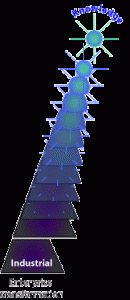 What does the Knowledge Economy Portend for the Industrial Economy organization? What does the Knowledge Economy Portend for the Industrial Economy organization?
Today, most of the world’s global commercial and governmental organizations increasingly find themselves confronted by the Knowledge Economy’s new success factors, which are often contrary to the Industrial Economy’s. Compounding the challenge, past competitors have had similar structures and limitations to incumbents’, which gave everyone more time to adapt to change; however, new Knowledge Economy competitors often do not have the same structures and limitations. Technology and globalization are changing the rules of engagement.
These developments leave industrial companies in an awkward situation. Now, they need to excel at collaborative innovation—historically a weak point—to capture and hold customers’ attention. In the Knowledge Economy, innovation will replace efficiency as the primary driver of value creation. Competitors that can engage rapidly shifting customer desires will dominate.
To succeed, incumbents must quickly become more adaptive and collaborative with external partners and customers. Moreover, they must transform themselves while they continue to operate at increasing levels of performance.
Industrial Economy Success Factors Knowledge Economy Success Factors Deliver vast quantity and low prices to relatively few broad […]
An Excellent Primer for the Core Competency of the 21st Century
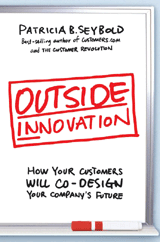 To thrive in the Knowledge Economy, companies will have to learn how to innovate at warp speed, or they will simply slip beneath the surface of the water like stricken liners. Ultra low costs and exceptional quality feature sets are merely expected, and they no longer differentiate. To thrive in the Knowledge Economy, companies will have to learn how to innovate at warp speed, or they will simply slip beneath the surface of the water like stricken liners. Ultra low costs and exceptional quality feature sets are merely expected, and they no longer differentiate.
Conventional wisdom holds that “innovation” cycles reappear every five years, when companies have exhausted the then-current cost-cutting approaches and need to focus on driving the top line.
However, the Knowledge Economy doesn’t call for your father’s innovation. The 21st century kind will require that companies turn themselves inside-out. Winners will learn to engage and catalyze their customers’ creativity. As author Patty Seybold aptly puts it, “Companies with the smartest customers win.” Outside Innovation is an in-the-trenches manual for evolving your company to embrace the innovation imperative.
[…]
 Chinese Prescription for Healthcare Providers predicts that China is showing itself to be very innovative in health care by implementing market-based offerings. The TEDA International Cardiovascular Hospital, just outside Beijing, offers six levels of service, ranging from $6.70 to $3,200 per night, as reported in “Hospital Caters to China’s Wealthy and Poor” in The Wall Street Journal or the hospital website. The lowest class of service has patients sharing a small room with other patients while “first class” includes a suite with a private gym, a garden, massage chair and other amenities. Chinese Prescription for Healthcare Providers predicts that China is showing itself to be very innovative in health care by implementing market-based offerings. The TEDA International Cardiovascular Hospital, just outside Beijing, offers six levels of service, ranging from $6.70 to $3,200 per night, as reported in “Hospital Caters to China’s Wealthy and Poor” in The Wall Street Journal or the hospital website. The lowest class of service has patients sharing a small room with other patients while “first class” includes a suite with a private gym, a garden, massage chair and other amenities.
China has an aging population of 1.3 billion to whom the government is struggling to provide health care. It regulates the prices of medicine and subsidizes basic services at public hospitals, but most people do not have western-type insurance and end up paying a major portion of their health care. The stakes are high today to solve the health care problem, and they are getting higher as the population ages.
[…]
A Must-read Guide to the Importance of Web 2.0 and the Knowledge Economy
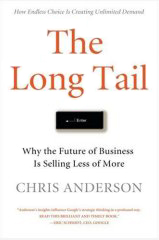 The Long Tail is a watershed book that reflects many of the profound socioeconomic changes wrought by the transition from the Industrial Economy to the Knowledge Economy. The “Long Tail” represents the splintering of the mass market—what is happening, why and how you can thrive in the new era of the niche. Moreover, it shows how the mass market was a temporary phenomenon that developed because niches were not economically viable for producers to address. The Long Tail is a watershed book that reflects many of the profound socioeconomic changes wrought by the transition from the Industrial Economy to the Knowledge Economy. The “Long Tail” represents the splintering of the mass market—what is happening, why and how you can thrive in the new era of the niche. Moreover, it shows how the mass market was a temporary phenomenon that developed because niches were not economically viable for producers to address.
Chris Anderson is editor-in-chief of Wired, and the book has an appreciation for culture, the economics of technology and the importance of innovation. It’s also very well written: Anderson tackles some fairly abstract concepts, but the reader doesn’t trip over them. It’s possible to read the book quickly, but there is plenty of substance for a detailed, reflective reading as well. Difficult to over-recommend!
The Long Tail offers an insightful look into the byte-oriented Knowledge Economy and its movement away from the zero-sum, bits-oriented Industrial Economy—and what this holds for business and culture. The book […]
|
|
 Web 2.0 and social networks readily appear as hype, but I will argue that they are actors in a much larger drama, the emergence of the Knowledge Economy, which is currently in its third phase, Web 2.0 and social networks. By understanding the transformation of relationships among your customers and between your customers and your company, you will be in a much better position to guide your company through this area of tremendous change.
Web 2.0 and social networks readily appear as hype, but I will argue that they are actors in a much larger drama, the emergence of the Knowledge Economy, which is currently in its third phase, Web 2.0 and social networks. By understanding the transformation of relationships among your customers and between your customers and your company, you will be in a much better position to guide your company through this area of tremendous change.
 After Gary Forsee’s luncheon address, a diverse panel of executives took the stage to discuss global technology leadership. Hardik Bhatt, CIO of the City of Chicago, Steve Goldman, Director of Architecture, the Chicago Mercantile Exchange, Raymond Spencer, CEO of Kanbay International, and David Weick, Global CIO of McDonald’s, shared their visions for Chicago’s global role in the world. Janet Kennedy, Midwest General Manager of Microsoft, gracefully moderated the panel discussion. The Executives’ Club of Chicago’s quarterly Technology Conference took place March 8 at the Chicago Hilton.
After Gary Forsee’s luncheon address, a diverse panel of executives took the stage to discuss global technology leadership. Hardik Bhatt, CIO of the City of Chicago, Steve Goldman, Director of Architecture, the Chicago Mercantile Exchange, Raymond Spencer, CEO of Kanbay International, and David Weick, Global CIO of McDonald’s, shared their visions for Chicago’s global role in the world. Janet Kennedy, Midwest General Manager of Microsoft, gracefully moderated the panel discussion. The Executives’ Club of Chicago’s quarterly Technology Conference took place March 8 at the Chicago Hilton. Gary D. Forsee, Chairman and CEO, Sprint Nextel Corporation, set the stage for the Executives’ Club of Chicago’s Technology Conference by outlining Sprint’s wireless strategy and a new vision for global community at the March enterprise CEO luncheon at the Chicago Hilton.
Gary D. Forsee, Chairman and CEO, Sprint Nextel Corporation, set the stage for the Executives’ Club of Chicago’s Technology Conference by outlining Sprint’s wireless strategy and a new vision for global community at the March enterprise CEO luncheon at the Chicago Hilton. LinkedIn is a “social” site that will prove to be of rare benefit to business executives and professionals in building individualized collaborative networks, as I explained in detail in the GHCJ Review of LinkedIn. However, LinkedIn is seriously lacking in providing a step-by-step guide to help the motivated executive to tap its real value. The functionality of the website is easy to use, but many of the finer points of LinkedIn are lost on the majority of users. This guide attempts to address that.
LinkedIn is a “social” site that will prove to be of rare benefit to business executives and professionals in building individualized collaborative networks, as I explained in detail in the GHCJ Review of LinkedIn. However, LinkedIn is seriously lacking in providing a step-by-step guide to help the motivated executive to tap its real value. The functionality of the website is easy to use, but many of the finer points of LinkedIn are lost on the majority of users. This guide attempts to address that. Michael L. Eskew, Chairman and CEO of UPS, outlined the package delivery giant’s vision for transforming itself into a “one-to-one” business at the Executives’ Club of Chicago’s Enterprise CEO Lunch, 15 February 2007. Before a packed house at the Chicago Hilton, he demonstrated UPS’s creative “whiteboard” marketing campaign and explained its role in communicating to customers the value of the company’s transformation.
Michael L. Eskew, Chairman and CEO of UPS, outlined the package delivery giant’s vision for transforming itself into a “one-to-one” business at the Executives’ Club of Chicago’s Enterprise CEO Lunch, 15 February 2007. Before a packed house at the Chicago Hilton, he demonstrated UPS’s creative “whiteboard” marketing campaign and explained its role in communicating to customers the value of the company’s transformation. As readers of these pages know well, I estimate that one of the most poignant changes that faces Industrial Economy enterprises is shifting their primary focus from production and operations to the customer. The Industrial Economy mechanized work and production, and by any measure it created unprecedented wealth by drastically lowering per-unit costs of any kind of product you can name, bringing more products within the means of more people. This worked extremely well while demand exceeded supply: customers were excited to have their first car/house/television, and they were happy with what producers brought to market.
As readers of these pages know well, I estimate that one of the most poignant changes that faces Industrial Economy enterprises is shifting their primary focus from production and operations to the customer. The Industrial Economy mechanized work and production, and by any measure it created unprecedented wealth by drastically lowering per-unit costs of any kind of product you can name, bringing more products within the means of more people. This worked extremely well while demand exceeded supply: customers were excited to have their first car/house/television, and they were happy with what producers brought to market. What does the Knowledge Economy Portend for the Industrial Economy organization?
What does the Knowledge Economy Portend for the Industrial Economy organization?  To thrive in the Knowledge Economy, companies will have to learn how to innovate at warp speed, or they will simply slip beneath the surface of the water like stricken liners. Ultra low costs and exceptional quality feature sets are merely expected, and they no longer differentiate.
To thrive in the Knowledge Economy, companies will have to learn how to innovate at warp speed, or they will simply slip beneath the surface of the water like stricken liners. Ultra low costs and exceptional quality feature sets are merely expected, and they no longer differentiate. Chinese Prescription for Healthcare Providers predicts that China is showing itself to be very innovative in health care by implementing market-based offerings. The TEDA International Cardiovascular Hospital, just outside Beijing, offers six levels of service, ranging from $6.70 to $3,200 per night, as reported in “Hospital Caters to China’s Wealthy and Poor” in The Wall Street Journal or the hospital website. The lowest class of service has patients sharing a small room with other patients while “first class” includes a suite with a private gym, a garden, massage chair and other amenities.
Chinese Prescription for Healthcare Providers predicts that China is showing itself to be very innovative in health care by implementing market-based offerings. The TEDA International Cardiovascular Hospital, just outside Beijing, offers six levels of service, ranging from $6.70 to $3,200 per night, as reported in “Hospital Caters to China’s Wealthy and Poor” in The Wall Street Journal or the hospital website. The lowest class of service has patients sharing a small room with other patients while “first class” includes a suite with a private gym, a garden, massage chair and other amenities. The Long Tail is a watershed book that reflects many of the profound socioeconomic changes wrought by the transition from the Industrial Economy to the Knowledge Economy. The “Long Tail” represents the splintering of the mass market—what is happening, why and how you can thrive in the new era of the niche. Moreover, it shows how the mass market was a temporary phenomenon that developed because niches were not economically viable for producers to address.
The Long Tail is a watershed book that reflects many of the profound socioeconomic changes wrought by the transition from the Industrial Economy to the Knowledge Economy. The “Long Tail” represents the splintering of the mass market—what is happening, why and how you can thrive in the new era of the niche. Moreover, it shows how the mass market was a temporary phenomenon that developed because niches were not economically viable for producers to address.